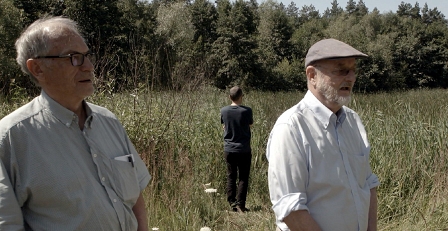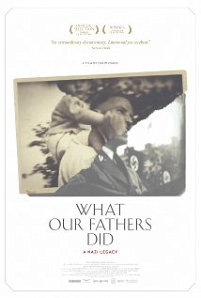Erstellt am: 2. 11. 2015 - 16:46 Uhr
"What Our Fathers Did"
Viennale auf FM4
Das Vienna International Film Festival vom 22. Oktober bis zum 5. November.
Alle Ausgaben des Viennale-Tagebuchs von Lukas Tagwerker
Fortunately it's a question that few of us will ever have to confront: What would you do if your father turned out to be a mass murderer? All the same, it is incredibly difficult to answer. What’s more, as a new film from Downton Abbey director David Evans shows, people’s responses can be wildly different.

Oscilloscope Laboratories
The film "A Nazi Legacy: What Our Fathers Did" follows friends Horst von Wächter and Niklas Frank, the sons of Nazi governors Otto von Wächter and Hans Frank, as they revisit childhood memories and see sites of the mass murders of Jews with scriptwriter and Human Rights lawyer Philippe Sands. Horst's and Frank's fathers are closely linked with the Holocaust in Poland and the Ukraine, whereas Sands' grandfather's family was wiped out in the extermination camps.
So far just a normal Nazi documentary. Yet in few other documentaries do the people involved bring the story to life. In few other documentaries is the story so gripping. The attitudes of Horst and Frank towards their fathers' legacies differ so violently that the viewer is often left in the middle of the two with a dizzying sense of bemusement. How can it possibly be that these two men are so far apart?!

Oscilloscope Laboratories
By far the most frustrating is Horst. Whereas Niklas is angered by what his father did, to a sometimes uncomfortable extent, Horst appears to contort as many threads of facts as he can cling to in order to absolve his father of most of his crimes.
In a memorable scene in a university hall in Lviv, where 75 years earlier Hans Frank spoke about exterminating Jews to an audience including Otto von Wächter, Horst denies his father's responsibility because few papers contain his father's signature. Even when confronted with Allied documents stating his crimes, he continues to believe his father was an innocent man.
It would be quite sad if it weren't so exasperating. In comparison to Niklas, whose father first believed he was the child of his friend Karl Lasch, Horst enjoyed a good relationship with his father. It seems clear that he cannot, and therefore will not, square the loving father he knew with the man who sent innocent people to their deaths. The discomfort is palpable.
In the middle of everything stands Philippe, trying with the viewer to make sense of the opposing views. At the beginning of the film, his demeanour is calm, and his searching questions betray his background as a lawyer. Yet as Horst continues to deny his father's crimes, Philippe's emotions surface as he strives to make Horst accept his father's past. It probably doesn't help that, as Philippe admitted in our interview, Horst has not once apologised for what happened to Philippe's family.
As a piece of storytelling the film is completely compelling. Niklas, and in particular Horst, should be congratulated for their bravery in coming forward and discussing such sensitive issues. Yet those who like to see people evolve and all loose ends tied up will likely remain rather frustrated. Obviously our feelings towards our fathers are not easily changed, no matter what they did.
The film is being shown at the Viennale on Tuesday 3rd November. Below are the extended interview with Philippe, Niklas and Horst.


